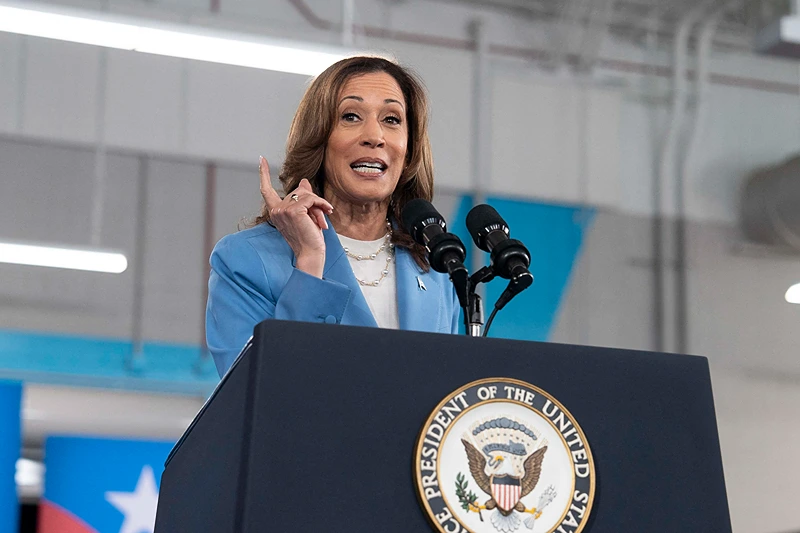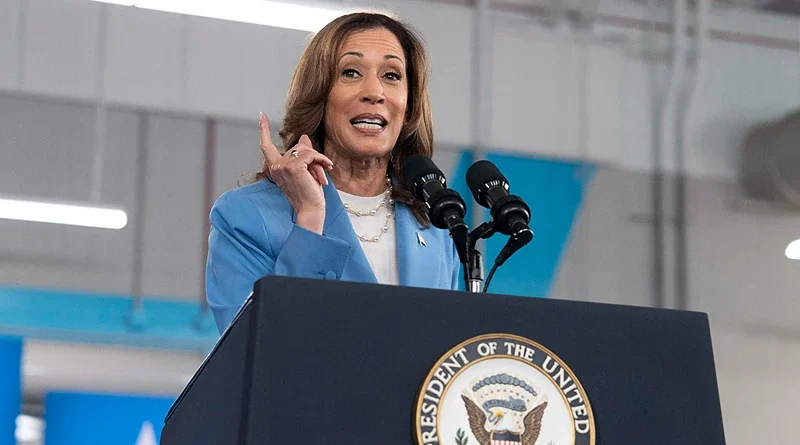Kamala Harris Announces Campaign’s Economic Strategy, Emulating a Promise Made by Trump – One America News Network

OAN Staff Brooke Mallory
5:09 PM – Friday, August 16, 2024
On Friday, Vice President Kamala Harris announced a number of policies that she says would be included in her economic platform should she be elected president this year.
Advertisement
A government ban on “grocery price gouging” is among the recommendations, along with increased housing developments supported by U.S. taxpayers.
If elected, Harris’s team claims that the plans are only a portion of her overall economic strategy and will be her top focus during her first 100 days in office.
Child Tax Credit
Harris’s plan would double the Child Tax Credit (CTC) to give families with newborn infants a $6,000 tax break.
According to a campaign fact sheet, the plan would provide “$6,000 in total tax relief for middle-income and low-income families” during the first year of their child’s life. Along with pushing for a $3,600 per child tax credit for some families, it also calls for the restoration of an expansion to the CTC that was passed as part of a comprehensive COVID-19 relief package in 2021, known as the American Rescue Plan.
In addition, the proposal suggests extending the Earned Income Tax Credit to individuals without children who have “lower-income jobs.”
However, her plans have already drawn harsh criticism from economic specialists who have warned that they lean toward government price fixing, despite the fact that the proposal is still lacking specific details.
“Having the government set prices is a really, really big mistake,” said Kevin Hassett, a former chairman of the Council of Economic Advisers.
Price Gouging
The proposal, which does not go into much detail about how it would be implemented, calls for the “first-ever federal ban on price gouging on food and groceries.”
Although Biden and Harris’s current administration has been widely criticized and accused for the last few years of driving inflation and prices up overall, she says that her new plan is a component of a bigger initiative to combat inflation and cut grocery prices.
“The proposal is very unfortunate,” said Hassett. “It could cause an enormous amount of damage to the economy, and it reveals the desire for the government to take over the economy that I think really does suggest that Harris agrees that the era of believing that if it’s good for free enterprise, it’s good for America, that that era is over.”
The proposal also asks for regulations to be put in place so that businesses “can’t unfairly exploit consumers to run up excessive profits on food and groceries,” as polls indicate that voters’ main concern in the months preceding the November presidential election is inflation.
“The plan additionally calls for ‘new authority’ for the Federal Trade Commission (FTC) and state attorneys general ‘to investigate and impose strict new penalties on companies that break the rules,’” the Hill reported.
Housing
In addition to what it referred to as the “first-ever” tax credit for developing starter houses for first-time homeowners, Harris’s proposal calls for the development of 3 million new housing units over the course of the next four years.
The proposal asks for a $40 billion federal fund to support additional construction as well as an extension of an already-existing tax credit for companies that develop affordable rental homes. A proposal to allow “federal lands eligible to be repurposed” for brand-new, “reasonably priced” housing complexes is also included in the plan.
The plan advocates for the passage of two bills: the Preventing the Algorithmic Facilitation of Rental Housing Cartels Act, which claims to give the FTC more authority to crack down on rent price coordination among property managers and landlords, and the Stop Predatory Investing Act, which is said to target tax breaks for investors who purchase 50 or more single-family rentals in an effort to counter rising home prices.
An additional proposal put up by Harris expands on a prior one made by the Biden administration, which aimed to give first-generation homebuyers $25,000 down payment assistance and a first-time homebuyer tax credit.
The Democrat’s campaign stated in a fact sheet that it seeks to “simplify and significantly expand” the former Biden plan “by providing on average $25,000 for all eligible first-time home buyers, while ensuring full participation by first-generation home buyers” and “more generous support for first-generation homeowners.”
Taxes On Tips
Stolen directly from Donald Trump’s playbook as one of his proposed measures if he were to be reelected, Harris has now similarly stated that she intends to end taxes on tips for hospitality and service workers.
However, Harris previously voted to pass legislation in 2022 that allowed the IRS to track down workers’ tips so that they could be taxed, making this new approach confusing to voters from both parties.
Medical Debit
Another proposal by Harris was “for the elimination of medical debt for millions of Americans,” which would also be supported by U.S. tax dollars.
However, there were many, even from Harris’s own political party, that opposed the new proposal.
Democrats’ voiced aspirations to “approve significant new expansions of the country’s safety net” are seen as incompatible with her recent endorsement to eliminate tip taxes, according to Democrat policy experts.
As part of her campaign against corporate price gouging, business executives who had hoped for a better rapport under Harris also objected to being held accountable for price increases, which many CEOs have maintained are affected by other factors than just selfish money-grubbing tactics.
Mandatory price-setting, according to economists, reduces incentives for businesses to develop supply, which is why it is a proposal that was much less likely to have been supported by other notable Democrat presidents in the past, such as Bill Clinton or Barack Obama.
The non-profit Committee for a Responsible Federal Budget calculated that over the following ten years, the initiatives under Harris’ economic plan would increase deficits by a whopping $1.7 trillion.
Stay informed! Receive breaking news blasts directly to your inbox for free. Subscribe here. https://www.oann.com/alerts
Advertisements below


